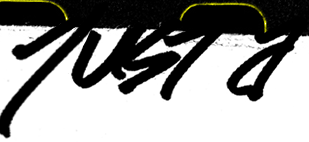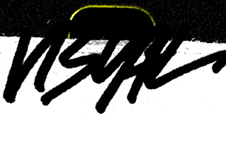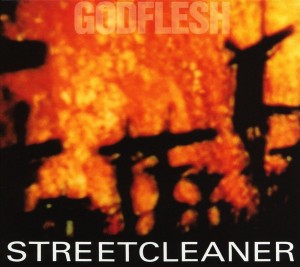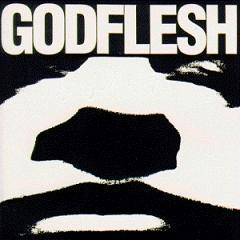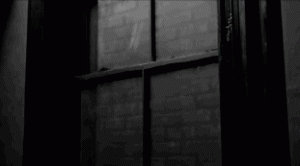
The Tiny Tears EP was originally intended to be the band’s second release after their self-titled album, but upon signing to Earache, the band was encouraged to create a full length record, and thus wound up with Streetcleaner. The four tracks recorded for Tiny Tears (sometimes attributed to the fabled “Black EP”) were released as bonus tracks on Streetcleaner after having been remixed numerous times – they were recorded tuned down to B (something unheard of, at the time) and were apparently inaudible. While technically not a separate release, the tone and quality of the songs differs so greatly from Streetcleaner that I consider them an entirely separate album. The intended cover of the EP was based off of the image from Eraserhead pictured to the right, but the band had been unable to get a clean enough image of it to use (remember that at this time, Eraserhead was still only available in copies with poor reproduction, often leaving viewers unable to tell what the images were on the screen).
The most glaring difference from Streetcleaner to Tiny Tears is the song lengths. While Streetcleaner is dominated by sweeping epics, grandiose in both scope and time, Tiny Tears’ songs are exactly that; small snapshots of deep emotional landscapes. By far the most punk of all Godflesh’s releases, the longest number clocks in at just over four minutes and the songs are predominantly up-tempo and hammering affairs which rely on the grinding riffs and thumping basslines for motivational force as opposed to the inventive drum-machine programming found on Streetcleaner. As such, it would come as little surprise to anyone that this is the collection of songs which sucked in this now-matured hardcore punker at a ripe young age. At the same time, most fans and critics consider this a footnote in the band’s history; a trifle that hardly captures the essence of the band’s sound. It’s unfortunate because this is both the most accessible of their works (making it a great starting point for fans of metal or hardcore who don’t vibe with industrial/electronic music), as well as the best suited for some old-fashioned rocking out. There’s hardly any time spent sitting back, contemplating, expanding your mind, wallowing, brooding, or otherwise sitting still; just pure headbanging. Which I am fine with; you don’t get that with any of their other releases and it makes for a prime soundtrack to running, biking, or any other physical activity.
Lyrically and vocally, these songs bear a closer resemblance to the self-titled EP over Streetcleaner. Whereas Justin focused mainly on direct barks and growls on Streetcleaner, all of the songs on Tiny Tears employ the “clean singing” approach, coupled with an excessive reverb effect which makes them almost entirely illegible. He explored this technique on the band’s first release (Veins, Spinebender), but these are the songs where you can see Justin getting really comfortable with how to utilize it, preparing himself for later releases (Slavestate, Pure, Selfless) where this effect would become transcendent. By creating this ethereal voice, which can barely be understood, it feels as if some cosmic entity is communicating with the listener instead of a fault-ridden human. On a more scientific approach; it allows the listener to experience the lyrics on an emotional level first and then fill in the details and contextual blanks him or herself. However, this effect also has made deciphering the actual lyrical content on these songs very difficult and my hat goes off to those dedicated nerds who have sifted through and posted “close enough interpretations” for my purposes (still can’t find anything for Suction, though…).
There’s something incredibly zen about this release as Justine explores the same bleak landscape he’s treading on Streetcleaner, but here he’s so calm and composed as the bombs drop around him. Lines such as “dying oceans, dead head, watching the figures, march without soul” are delivered with a soulful panache that makes them reassuring and clarifying rather than depressing and angsty. Coupling that with the aforementioned Motorhead drive makes these songs almost revelatory; if it was possible for Godflesh to have “party jams” than these songs would be them. This is the secret weapon that makes me love Godflesh so much; most “extreme” musical acts can articulate how awful something is and express anger or sadness eloquently, but it is a rare find to discover an artist, of any kind, who can articulate the feeling of awareness and experience of the horrible and miserable, but also the understanding of it’s inevitability and essential place within the human condition. The machinations of our oppression may be destroyed, but there will always be a new beast of suffering.
These are blatantly some of the best early Godflesh songs and I’m adamant about the fact that if these tracks had come out as a separate release from Streetcleaner (before or afterwards), with full artwork and presentation, they would be considered by the masses to be up there with the two bookending releases. Tiny Tears, being the title track, has garnered worthy attention, as well as Wound (mostly from having been re-mixed and re-released on the Slateman single), but the almost the entire world passes over Dead Head and Suction; two very powerful hidden gems. Yes, these songs are not taken to the inevitable extremes that Godflesh’s sound dictated, but from a purely “are these good rock songs?” perspective; dynamite.
Here’s a pretty great video of the band performing Tiny Tears live @ a tiny club in 1990. The boys are incredibly tight and Justin looks to be at his peak of looking sick and/or creepy live; http://www.youtube.com/watch?v=RAFVZ3ticZQ
